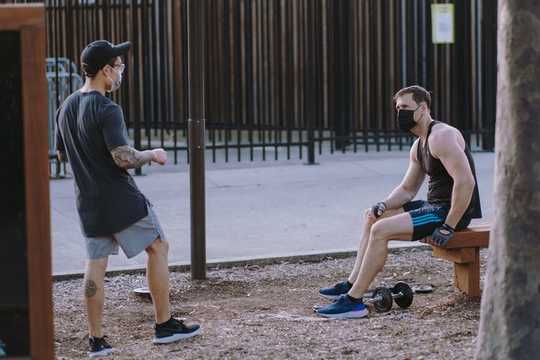 Instability and stress can exacerbate insecurities and increase conflict for couples. (Unsplash)
Instability and stress can exacerbate insecurities and increase conflict for couples. (Unsplash)
Many of us are several weeks into stay-at-home directives from our governments and health officials. For many, social distancing means sharing a confined space with romantic partners while navigating new stressful issues including sudden unemployment, working from home, child care and the never ceasing uncertainty.
Unsurprisingly, there are reports of divorce rates skyrocketing in China since the outbreak of COVID-19. Instability and stress can exacerbate insecurities and increase conflict for couples. As a scholar and a couple and family therapist, I offer five practical, evidence-based tips for couples when being stuck at home is making you feel stuck in your relationship.
1. Take space
Sharing a physical space with your partner for extended periods of time can increase pressure and stress. Without the daily routine of leaving the home, your space may begin to feel very small and irritation with one another may escalate quickly.
Research demonstrates that actively choosing to take alone time can contribute to relaxation and reduced stress. Consider taking regular blocks of alone time each day, whether it is a walk around the neighbourhood, closing the door to a room where you will not be disturbed or engaging in an activity that is just for you.
Communicating how you plan to take space will help your partner know how to support your efforts, and will encourage them to do the same. If you’re not taking care of yourself, you will have little to offer your partner.
2. Where possible, use “I” statements
When you need to tell your partner how you feel, try to speak from your perspective as opposed to accusing them of doing something wrong. For example, “I feel really defeated when I continue to find dirty dishes in the sink. Is there any way you can help me keep the kitchen clean?”
Using “I” language has been found to reduce perceptions of hostility and anger. “I” statements can help your partner hear your perspective instead of interpreting it as an attack and becoming defensive.
3. Press pause
Press pause on conflicts that are not going anywhere and set a time to try again later. When conflicts become heated, many couples enter into an automatic “fight, flight or freeze” response.
Our brains can experience conflict as a threat, and emotions and defences can become activated. When this happens we shut down and conflict resolution becomes impossible. If you notice you or your partner getting angry or distressed in a conflict, request to put the conversation on pause to give you both a chance to step back, breathe and think.
 Press pause on arguments. (Kate Trifo/Unsplash)
Press pause on arguments. (Kate Trifo/Unsplash)
Once stress levels are lower, complex thinking, reflection and reasoning become possible. Set an agreed upon time to return to the discussion when you’re both awake, nourished and feeling more calm.
4. What’s your part?
If you find yourself continuing to get stuck in conflict with your partner, ask yourself, what part do I play in this conflict? Do I nag or pursue my partner when I am feeling anxious? Or, do I have a tendency to shut down, or avoid my partner when I am feeling pressured?
Emotionally focused therapist and researcher Sue Johnson, has found that couples often get stuck in problematic interaction cycles. Considering what role you take in a conflict cycle can help you try out new positions.
 Adopt new positions in the household. (Soroush Karimi/Unsplash)
Adopt new positions in the household. (Soroush Karimi/Unsplash)
For example, what happens when you respond to your partner’s anxiety with compassion as opposed to feeling annoyed and walking away? What happens when you share your worries with your partner, instead of getting angry at them for not taking the garbage out, or not helping enough with child care?
Couples who are able to adopt new positions in their relationship and try new ways of responding are more able to interrupt problematic interaction cycles.
5. Acknowledge strengths
Try to acknowledge one another’s strengths. What special skills does your partner have to get through hard times? If your partner is the one making home school schedules for the kids, or braving the grocery store while you work, let them know they are appreciated and compliment their ability to handle difficult situations.
 Appreciating a partner’s strengths can lead to greater intimacy. (Arren Mills/Unsplash)
Appreciating a partner’s strengths can lead to greater intimacy. (Arren Mills/Unsplash)
Note what strengths they have that you admire. As recent research demonstrated, greater appreciation for one’s partner’s strengths predicted increased relationship satisfaction and intimacy. Acknowledging your partner’s positive attributes creates more good feelings between you.
While these tips will help you mitigate conflict in your relationship, remember to not expect perfection. These are stressful times, and you will inevitably lose your patience and experience frustration. Compassion for yourself and your partner will go a long way as you navigate these uncharted waters together.![]()
About The Author
Kara Fletcher, Assistant Professor, Faculty of Social Work, University of Regina
This article is republished from The Conversation under a Creative Commons license. Read the original article.
Books on Couples from Amazon's Best Sellers list
"The Seven Principles for Making Marriage Work: A Practical Guide from the Country's Foremost Relationship Expert"
by John Gottman and Nan Silver
This best-selling book offers practical advice and strategies for building and maintaining a strong and healthy marriage. Drawing on decades of research, the author outlines seven key principles for creating a successful partnership, including improving communication, managing conflict, and fostering intimacy.
Click for more info or to order
"Hold Me Tight: Seven Conversations for a Lifetime of Love"
by Sue Johnson
This book provides a step-by-step guide to improving communication and strengthening emotional bonds in romantic relationships. Drawing on the principles of attachment theory, the author offers practical advice and exercises for couples looking to deepen their connection and build a more fulfilling relationship.
Click for more info or to order
"The Love Dare"
by Alex Kendrick and Stephen Kendrick
This popular book offers a 40-day challenge to help couples strengthen their relationship and grow closer to each other. Each day presents a new "dare," such as expressing gratitude or practicing forgiveness, designed to deepen the connection between partners.
Click for more info or to order
"Men Are from Mars, Women Are from Venus: The Classic Guide to Understanding the Opposite Sex"
by John Gray
This classic book offers a humorous and insightful look at the differences between men and women in relationships. The author offers practical advice for bridging the gap and improving communication between partners.
Click for more info or to order
"The Relationship Cure: A 5 Step Guide to Strengthening Your Marriage, Family, and Friendships"
by John Gottman
This book provides a research-based approach to improving relationships of all kinds, including romantic partnerships. The author outlines five key steps for creating stronger and more fulfilling connections with others, drawing on his extensive experience as a couples therapist and researcher.























